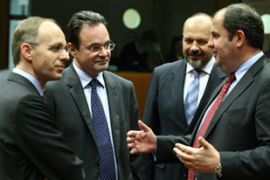EU agrees $960bn ‘stability’ deal
Emergency package aimed at protecting euro zone economies amid Greek debt crisis.

Olli Rehn, the EU’s monetary affairs commissioner, said the agreement “proves that we shall defend the euro whatever it takes”.
Market ‘wolf pack’
The safety net was meant to fend off what Anders Borg, the Swedish finance minister, called the “wolf pack” of financial markets from preying on countries with bloated budgets, such as Portugal, Spain and Ireland.
| in depth | |||||||||||||||||||||||||||||
|
Asian stock markets rose on Monday following the EU announcement, with major benchmarks such as Japan’s Nikkei and Hong Kong’s Hang Seng leading the advance.
The euro, which last week sank to a 14-month low against the dollar, rose in early trade in Asia while prices of gold, considered a safe haven investment, fell after touching near record highs last week.
The EU’s slow response to the crisis and its failure to keep Greece from reaching the brink of bankruptcy triggered slides in the euro and global stocks last week, and intensified fears the crisis would spread.
Jan Friederich, a senior economist with The Economist Intelligence Unit, a management and advisory firm in Hong Kong, said the EU emergency package was likely to lead to a lot of support for European markets in the short term.
“But the long-term issue of whether restructuring will be needed after the programme fades out in three years will remain a serious issue of concern,” he told Al Jazeera.
“The big concern is that now more and more governments are instituting consolidation programmes that will undermine the GDP growth in these countries.
“That of course has a very serious impact on public finances. That in a way is also undermining the capacity of these governments to pay back their debts in the long term.”
Consolidation measures
Ministers from Spain and Germany said on Monday that euro zone countries would speed up their efforts to tackle their fiscal problems, with Spain and Portugal committing to “take significant additional consolidation measures in 2010 and 2011” and present them to the EU’s finance ministers on May 18.
The IMF welcomed the EU’s announcement, saying it would help restore confidence and financial stability in euro zone countries.
“These are strong measures that will help to secure global economic and financial stability, and preserve the global economic recovery,” Dominique Strauss-Kahn, the IMF chief, said.
“Implementation of actions to put public finances on a sustainable footing is key to restoring economic health in Europe.”
The G20 group of developed and developing nations said that the measures would address “severe tensions in financial markets”.
“The G20 will continue to monitor closely the development of global markets, and remains strongly committed to continue to work together to maintain global financial stability and ensure strong, sustainable and balanced growth,” it said in a statement from South Korea.
Financial speculation
The actions of financial speculators have been criticised for exacerbating the crisis and threatening contagion into other weak euro zone economies.
But some euro zone nations blamed fragile government and a lack of European co-operation for the crisis.
 |
| The euro sank to a 14-month low against the US dollar last week [Reuters] |
Josef Proell, the Austrian finance minister, said he was “against putting all the blame on speculation”.
“Speculation is only successful against countries that have mismanaged their finances for years,” he said.
Policymakers around the globe are worried the crisis in Greece could spread to other countries, fears compounded by the unexplained shock plunge in US stocks that shook up already nervous markets.
In a sign of the global concerns about the euro zone’s crisis, Barack Obama, the US president, spoke by phone with Angela Merkel, the German chancellor, about the importance of EU members acting to build confidence in markets.
And the US Federal Reserve, or central bank, on Sunday opened a programme to ship US dollars to Europe in a move to head off a broader financial crisis on the continent.
Other central banks, including the Bank of Canada, the Bank of England, the European Central Bank and the Swiss National Bank, are also involved in the effort.
The Bank of Japan on Monday offered $21.6bn in liquidity, the second financial injection since Sunday, in an attempt to calm the markets.
